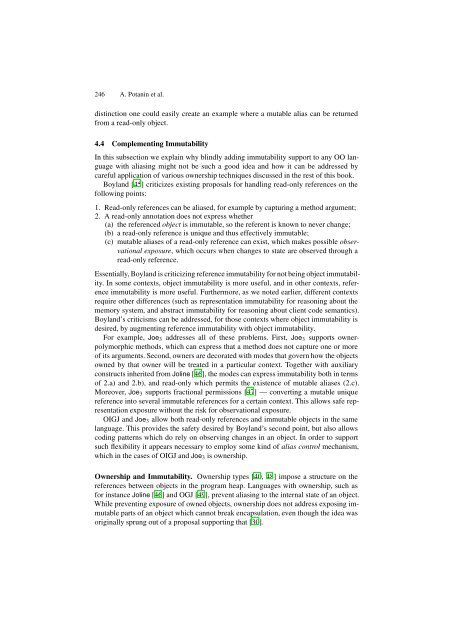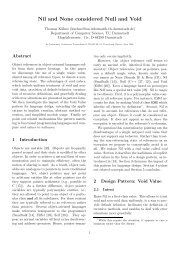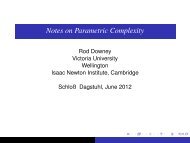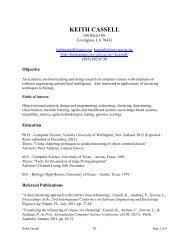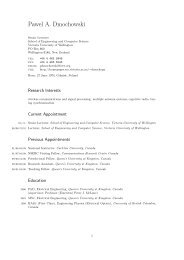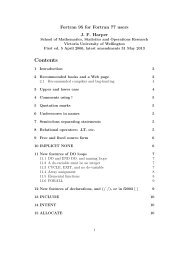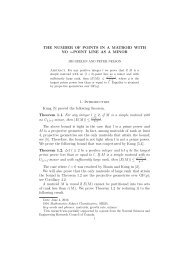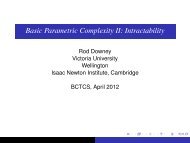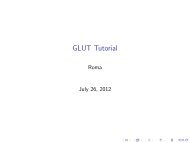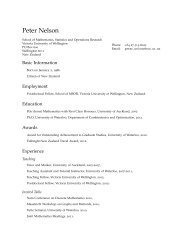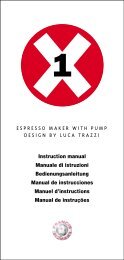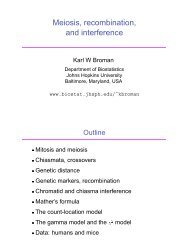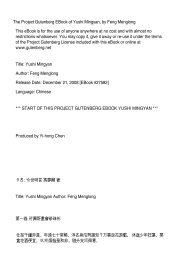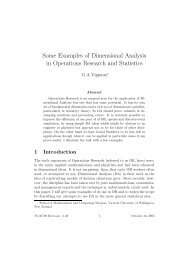Immutability - ECS | Victoria University of Wellington
Immutability - ECS | Victoria University of Wellington
Immutability - ECS | Victoria University of Wellington
Create successful ePaper yourself
Turn your PDF publications into a flip-book with our unique Google optimized e-Paper software.
246 A. Potanin et al.<br />
distinction one could easily create an example where a mutable alias can be returned<br />
from a read-only object.<br />
4.4 Complementing <strong>Immutability</strong><br />
In this subsection we explain why blindly adding immutability support to any OO language<br />
with aliasing might not be such a good idea and how it can be addressed by<br />
careful application <strong>of</strong> various ownership techniques discussed in the rest <strong>of</strong> this book.<br />
Boyland [45] criticizes existing proposals for handling read-only references on the<br />
following points:<br />
1. Read-only references can be aliased, for example by capturing a method argument;<br />
2. A read-only annotation does not express whether<br />
(a) the referenced object is immutable, so the referent is known to never change;<br />
(b) a read-only reference is unique and thus effectively immutable;<br />
(c) mutable aliases <strong>of</strong> a read-only reference can exist, which makes possible observational<br />
exposure, which occurs when changes to state are observed through a<br />
read-only reference.<br />
Essentially, Boyland is criticizing reference immutability for not being object immutability.<br />
In some contexts, object immutability is more useful, and in other contexts, reference<br />
immutability is more useful. Furthermore, as we noted earlier, different contexts<br />
require other differences (such as representation immutability for reasoning about the<br />
memory system, and abstract immutability for reasoning about client code semantics).<br />
Boyland’s criticisms can be addressed, for those contexts where object immutability is<br />
desired, by augmenting reference immutability with object immutability.<br />
For example, Joe 3 addresses all <strong>of</strong> these problems. First, Joe 3 supports ownerpolymorphic<br />
methods, which can express that a method does not capture one or more<br />
<strong>of</strong> its arguments. Second, owners are decorated with modes that govern how the objects<br />
owned by that owner will be treated in a particular context. Together with auxiliary<br />
constructs inherited from Joline [46], the modes can express immutability both in terms<br />
<strong>of</strong> 2.a) and 2.b), and read-only which permits the existence <strong>of</strong> mutable aliases (2.c).<br />
Moreover, Joe 3 supports fractional permissions [47] — converting a mutable unique<br />
reference into several immutable references for a certain context. This allows safe representation<br />
exposure without the risk for observational exposure.<br />
OIGJ and Joe 3 allow both read-only references and immutable objects in the same<br />
language. This provides the safety desired by Boyland’s second point, but also allows<br />
coding patterns which do rely on observing changes in an object. In order to support<br />
such flexibility it appears necessary to employ some kind <strong>of</strong> alias control mechanism,<br />
which in the cases <strong>of</strong> OIGJ and Joe 3 is ownership.<br />
Ownership and <strong>Immutability</strong>. Ownership types [40, 48] impose a structure on the<br />
references between objects in the program heap. Languages with ownership, such as<br />
for instance Joline [46] and OGJ [49], prevent aliasing to the internal state <strong>of</strong> an object.<br />
While preventing exposure <strong>of</strong> owned objects, ownership does not address exposing immutable<br />
parts <strong>of</strong> an object which cannot break encapsulation, even though the idea was<br />
originally sprung out <strong>of</strong> a proposal supporting that [30].


